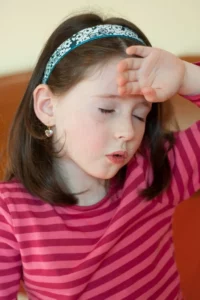Concussions, a form of traumatic brain injury Affecting approximately 2 million US children under 18, concussions can negatively impact physical, mental, emotional and sleep health. Parents and doctors agree that it’s difficult to tell when a child has recovered their full cognitive function after a concussion. A new device that could improve concussion recovery in children may change this.
Grants can help you
Asimina kiourti is an associate professor of electrical and computer engineering, The Ohio State University. Ginger Yang, principal researcher at Abigail Wexner Research Institute at Nationwide Children’s Hospital and the Center for Injury Research and Policy, received a $500,000 three-year grant from the National Science Foundation to measure cognitive load with a wearable device to monitor the recovery process for children after a brain injury.
Currently, the effects of cognitive activities on concussions in children are not well-characterized. This is mainly due to the difficulty in quantifying cognitive workload, which is the amount of mental effort an individual puts forth in response to a given task. Unfortunately, there is no technology that can measure an individual’s cognitive workload using a low-cost, seamless and reliable approach.
A seed grant from Ohio State’s Chronic Brain Injury Research Theme triggered this collaboration, said Kiourti. He is a faculty affiliate with the ElectroScience Laboratory and Chronic Brain Injury Program. Through this interdisciplinary partnership, we identified critical holes in the current state of the art for cognitive workload monitoring. No wearable sensor has been developed that can accurately and seamlessly quantify workloads in real-world environments.
Returning too early to activities can affect concussion recovery
Yang said that symptoms of concussions can last anywhere from a couple days to up to a full month. This can affect the cognitive function and return to school. The problem with determining when children can resume normal activities is they cannot accurately report their symptoms. This leads to a “trial-and-error” approach.
It is important to know when cognitive function has fully recovered following a concussion.
Measure cognitive function with wearable sensor
This research is aimed at monitoring cognitive workload by using a wearable Cyber-Physical System (CPS) equipped with a new magnetocardiography sensor (MCG). The MCG sensor, which was developed by Kiourti’s team, is the first wearable of its kind. It is worn by a person on their chest and collects magnetic fields associated with brain activity. The CPS system sends real-time alerts to parents based on the brain activity of their child to determine what level of cognitive load they should be exposed.
Wearable CPSs can help clinicians make informed decisions about concussion recovery. They will also be able to determine when the best time is for children with concussions resume their normal activities. The portable device can be worn by a child as they begin to return to normal activities to collect data about their cognitive activity. It will also send real-time alerts if the child is pushing their brain beyond its limits.
Kiourti’s team will be leading the effort to better understand how the MCG sensor performs in real-world situations. Yang will be in charge of the evaluation and experimentation by monitoring the cognitive activity of children. Md Asiful, an associate Professor at the Bangladesh University of Engineering and Technology and former visiting scholar at ESL will consult both teams regarding the classification of cognitive data collected by the sensor.
This research, which aims to speed up the recovery of children from concussions, could also have application in diverse disciplines such as pilot training, user interfaces, performance by humans in dangerous missions, or educational outcomes.
Original Blog: https://rehabpub.com/conditions/neurological/brain-injury-neurological/could-device-improve-kids-concussion-recovery/


Leave a Reply